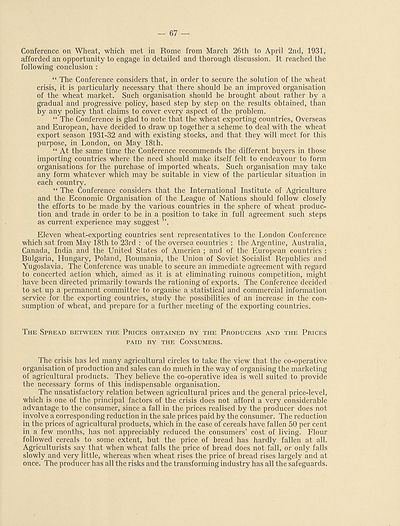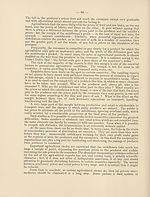Download files
Complete book:
Individual page:
Thumbnail gallery: Grid view | List view

— 67 —
Conference on Wheat, which met in Rome from March 26th to April 2nd, 1931,
afforded an opportunity to engage in detailed and thorough discussion. It reached the
following conclusion :
“ The Conference considers that, in order to secure the solution of the wheat
crisis, it is particularly necessary that there should be an improved organisation
of the wheat market. Such organisation should be brought about rather by a
gradual and progressive policy, based step by step on the results obtained, than
by any policy that claims to cover every aspect of the problem.
“ The Conference is glad to note that the wheat exporting countries, Overseas
and European, have decided to draw up together a scheme to deal with the wheat
export season 1931-32 and with existing stocks, and that they will meet for this
purpose, in London, on May 18th.
“ At the same time the Conference recommends the different buyers in those
importing countries where the need should make itself felt to endeavour to form
organisations for the purchase of imported wheats. Such organisation may take
any form whatever which may be suitable in view of the particular situation in
each country.
“ The Conference considers that the International Institute of Agriculture
and the Economic Organisation of the League of Nations should follow closely
the efforts to be made by the various countries in the sphere of wheat produc¬
tion and trade in order to be in a position to take in full agreement such steps
as current experience may suggest
Eleven wheat-exporting countries sent representatives to the London Conference
which sat from May 18th to 23rd : of the oversea countries : the Argentine, Australia,
Canada, India and the United States of America ; and of the European countries :
Bulgaria, Hungary, Poland, Roumania, the Union of Soviet Socialist Republics and
Yugoslavia. The Conference was unable to secure an immediate agreement with regard
to concerted action which, aimed as it is at eliminating ruinous competition, might
have been directed primarily towards the rationing of exports. The Conference decided
to set up a permanent committee to organise a statistical and commercial information
service for the exporting countries, study the possibilities of an increase in the con¬
sumption of wheat, and prepare for a further meeting of the exporting countries.
The Spread between the Prices obtained by the Producers and the Prices
PAID BY THE CONSUMERS.
The crisis has led many agricultural circles to take the view that the co-operative
organisation of production and sales can do much in the way of organising the marketing
of agricultural products. They believe the co-operative idea is well suited to provide
the necessary forms of this indispensable organisation.
The unsatisfactory relation between agricultural prices and the general price-level,
which is one of the principal factors of the crisis does not afford a very considerable
advantage to the consumer, since a fall in the prices realised by the producer does not
involve a corresponding reduction in the sale prices paid by the consumer. The reduction
in the prices of agricultural products, which in the case of cereals have fallen 50 per cent
in a few months, has not appreciably reduced the consumers’ cost of living. Flour
followed cereals to some extent, but the price of bread has hardly fallen at all.
Agriculturists say that when wheat falls the price of bread does not fall, or only falls
slowly and very little, whereas when wheat rises the price of bread rises largely and at
once. The producer has all the risks and the transforming industry has all the safeguards.
Conference on Wheat, which met in Rome from March 26th to April 2nd, 1931,
afforded an opportunity to engage in detailed and thorough discussion. It reached the
following conclusion :
“ The Conference considers that, in order to secure the solution of the wheat
crisis, it is particularly necessary that there should be an improved organisation
of the wheat market. Such organisation should be brought about rather by a
gradual and progressive policy, based step by step on the results obtained, than
by any policy that claims to cover every aspect of the problem.
“ The Conference is glad to note that the wheat exporting countries, Overseas
and European, have decided to draw up together a scheme to deal with the wheat
export season 1931-32 and with existing stocks, and that they will meet for this
purpose, in London, on May 18th.
“ At the same time the Conference recommends the different buyers in those
importing countries where the need should make itself felt to endeavour to form
organisations for the purchase of imported wheats. Such organisation may take
any form whatever which may be suitable in view of the particular situation in
each country.
“ The Conference considers that the International Institute of Agriculture
and the Economic Organisation of the League of Nations should follow closely
the efforts to be made by the various countries in the sphere of wheat produc¬
tion and trade in order to be in a position to take in full agreement such steps
as current experience may suggest
Eleven wheat-exporting countries sent representatives to the London Conference
which sat from May 18th to 23rd : of the oversea countries : the Argentine, Australia,
Canada, India and the United States of America ; and of the European countries :
Bulgaria, Hungary, Poland, Roumania, the Union of Soviet Socialist Republics and
Yugoslavia. The Conference was unable to secure an immediate agreement with regard
to concerted action which, aimed as it is at eliminating ruinous competition, might
have been directed primarily towards the rationing of exports. The Conference decided
to set up a permanent committee to organise a statistical and commercial information
service for the exporting countries, study the possibilities of an increase in the con¬
sumption of wheat, and prepare for a further meeting of the exporting countries.
The Spread between the Prices obtained by the Producers and the Prices
PAID BY THE CONSUMERS.
The crisis has led many agricultural circles to take the view that the co-operative
organisation of production and sales can do much in the way of organising the marketing
of agricultural products. They believe the co-operative idea is well suited to provide
the necessary forms of this indispensable organisation.
The unsatisfactory relation between agricultural prices and the general price-level,
which is one of the principal factors of the crisis does not afford a very considerable
advantage to the consumer, since a fall in the prices realised by the producer does not
involve a corresponding reduction in the sale prices paid by the consumer. The reduction
in the prices of agricultural products, which in the case of cereals have fallen 50 per cent
in a few months, has not appreciably reduced the consumers’ cost of living. Flour
followed cereals to some extent, but the price of bread has hardly fallen at all.
Agriculturists say that when wheat falls the price of bread does not fall, or only falls
slowly and very little, whereas when wheat rises the price of bread rises largely and at
once. The producer has all the risks and the transforming industry has all the safeguards.
Set display mode to:
![]() Universal Viewer |
Universal Viewer | ![]() Mirador |
Large image | Transcription
Mirador |
Large image | Transcription
Images and transcriptions on this page, including medium image downloads, may be used under the Creative Commons Attribution 4.0 International Licence unless otherwise stated. ![]()
| League of Nations > Economic and financial section > Agricultural crisis > Volume 1 > (69) |
|---|
| Permanent URL | https://digital.nls.uk/190903547 |
|---|
| Shelfmark | LN.II.2/2.(35) |
|---|---|
| Attribution and copyright: |
|
| Shelfmark | LN.II.2/2.(35-35) |
|---|---|
| Shelfmark | LN.II |
|---|
| Description | Over 1,200 documents from the non-political organs of the League of Nations that dealt with health, disarmament, economic and financial matters for the duration of the League (1919-1945). Also online are statistical bulletins, essential facts, and an overview of the League by the first Secretary General, Sir Eric Drummond. These items are part of the Official Publications collection at the National Library of Scotland. |
|---|---|
| Additional NLS resources: |
|

